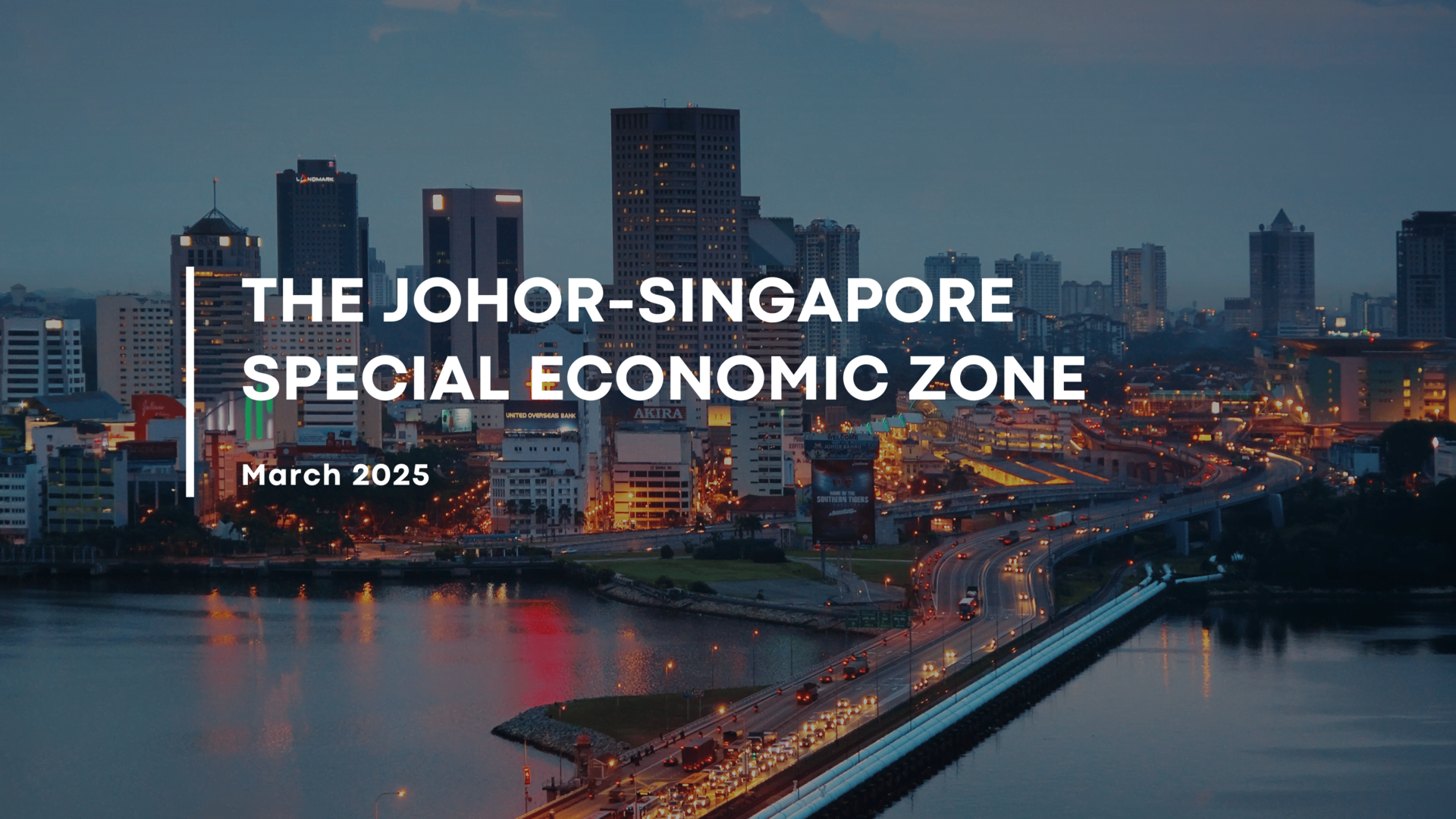On 11 January 2024, a Memorandum of Understanding (MOU) was signed between the Singapore Minister for Trade and Industry and Malaysia’s Minister of Economic Affairs, marking the inception of the Johor-Singapore Special Economic Zone (JS-SEZ). Modelled after China’s Shenzhen Special Economic Zone, this initiative aims to enhance trade, connectivity, and economic synergy between Malaysia and Singapore, encouraging technology transfer and industrial growth whilst strengthening bilateral relations through economic collaboration. On 7 January 2025, the governments of Malaysia and Singapore entered into an agreement to establish the JS-SEZ, nearly a year after the proposal was initially agreed upon in principle.
1. Strategic Importance
Proposed Coverage and Core Sectors
The JS-SEZ is slated to cover an area governed by six local authorities, encompassing approximately 3,500 square kilometres—five times the size of Singapore. The zone stretches from Kulai and parts of Pontian to Pengerang, offering vast opportunities for development.1 To date, it intends to include the following flagship areas2 prioritizing the various core sectors below:3
- Johor Bahru Centre (Business services, digital economy, health)
- Iskandar Puteri (Manufacturing, business services, digital economy, education, health, tourism)
- Tanjung Pelepas -Tanjung Bin (Manufacturing, energy, logistics)
- Pasir Gudang (Manufacturing, energy, logistics)
- Senai-Skudai (Manufacturing, digital economy, education, logistics, tourism)
- Sedenak (Manufacturing, business services, digital economy, education, energy, food security, health, logistics, tourism)
- Forest City (Financial services)
- Pengerang Integrated Petroleum Complex (Manufacturing, energy, logistics)
- Desaru (Education, food security, health, tourism)
2. Initiatives
Key Initiatives
The following initiatives have been proposed to drive the success of the JS-SEZ:4
- A one-stop business or investment service centre in Johor.
- Implementing a passport-free QR code clearance system on both sides.
- Digitised processes for cargo clearance at the land checkpoints.
- Co-organising an investors forum to gather feedback from businesses on the Johor-Singapore SEZ.
- Facilitating Malaysia-Singapore renewable energy cooperation in the zone.
- Curating training to address talent and skill gaps for industries in the SEZ.
- Developing joint promotional events between Johor and Singapore to promote trade and investment in the SEZ.
3. Recent Developments
a. Workforce Development
A RM20 million allocation has been approved by the Deputy Prime Minister Datuk Seri Dr Ahmad Zahid Hamidi to the Johor Talent Development Council through HRD Corp to launch training programs tailored to market demands and work-based learning programs to address talent gaps.5
b. Infrastructure
Under the JS-SEZ agreement, Malaysia will establish an infrastructure fund for the zone, while Singapore will create a facilitation fund. Malaysia will be responsible for constructing roads, utilities, and other essential infrastructure to support new projects in the zone. Meanwhile, Singapore will provide financial assistance to help Singaporean companies expand and support multinational corporations in establishing a presence in both the JS-SEZ and Singapore.6
c. Renewable Energy
The JS-SEZ places a strong emphasis on renewable energy, with a Renewable Energy Certificates (RECs) framework currently being developed to facilitate cross-border electricity trade and promote renewable energy projects in the region.
As a tangible step forward, Tenaga Nasional Berhad (TNB) Malaysia and Sembcorp Power Singapore have signed an agreement for the delivery of 50 MW of green electricity to Singapore through the Energy Exchange Malaysia (ENEGEM) platform. In addition, there are plans to import 1 GW of hydropower from Sarawak to Singapore by 2032, which will be one of the largest clean energy projects in Southeast Asia.7
d. Invest Malaysia Facilitation Centre in Johor (IMFC-J)
The establishment of the IMFC-J acts as a one-stop facilitation centre, offering consultation services and simplifying business processes. This one-stop regulatory authority is entrusted with overseeing all investment matters in Johor, encompassing the JS-SEZ, the Forest City Special Financial Zone, and future initiatives focused on driving further investments into the state.8
e. Enhanced and Seamless Connectivity
The Johor Bahru-Singapore Rapid Transit Link (RTS Link) project, scheduled for completion in January 2027, will significantly improve accessibility and alleviate congestion at the Johor Causeway.9 The RTS Link is a railway shuttle link approximately 4km in length with two stations, one in Bukit Chagar, Johor Bahru, Malaysia and one in Woodlands Singapore. The link will have a capacity of 10,000 passengers per hour, per direction and an expected ridership of about 40,000 passengers per day upon opening10.
Once completed, Singaporeans and other foreign travellers could clear Johor’s land checkpoints using only QR codes, without the need to present their passports. Johor state government senior official Lee Ting Han stated that Malaysian authorities aim to extend QR code-based immigration clearance to Singaporeans and other foreign passport holders by mid-year 2025.11
f. Favourable tax measures
The Finance Ministry in collaboration with the Johor State Government revealed the details of a tax incentive package for the JS-SEZ and that further tax incentives and flagship zones will be announced in due course. Effective from 1 January 2025, the JS-SEZ provides the following incentives12:
- Special corporate tax rate
Companies making new investments in eligible manufacturing and services sectors, including AI, quantum computing, medical devices, aerospace manufacturing, and global services hubs, will enjoy a corporate tax rate of 5% for up to 15 years. On 15 January 2025, the Johor Investment, Trade, Consumer Affairs and Human Resources Committee Chairman, Lee Ting Han informed reporters on the sidelines of an event on 14 January 2025 that “Investors that fund more than RM1 billion in the JS-SEZ will be offered a corporate tax rate of 5% for a period of 15 years while investors that finance RM500 million to RM1 billion will be offered 5% for a period of ten years.”13 These rates are significantly lower than the current Malaysian corporate tax rate of 24%.
- Flagship development focus
Additional tailor-made incentives for businesses operating in certain flagship areas within the JS-SEZ.
- Special tax rate for knowledge workers
15% for ten years for eligible knowledge workers employed in the JS-SEZ.
- Entertainment duty reductions
The reduction in entertainment duties aims to stimulate tourism and leisure-related investments in line with the broader objectives of the JS-SEZ.
g. Forest City Special Financial Zone (SFZ)
In August 2023, Malaysia announced the Forest City Special Financial Zone (“Forest City SFZ”), which is expected to complement the JS-SEZ. On 12 August 2024, the Johor Government proposed integrating the Forest City SFZ into the JS-SEZ to enhance collaboration14. The Key Features of the Forest City SFZ are, among other things:15
- Concessionary Corporate Tax Rates: Ranging from 0% to 5% to attract businesses.
- Special Individual Income Tax Rate: A 15% tax rate for skilled professionals and high-net-worth individuals.
- Family Wealth Office Incentives: A 0% tax rate for family offices for ten years, extendable with increased investments under the Single-Family Office (SFO) Scheme.
- Financial Institution Incentives: Relocation cost deductions and enhanced building allowances and withholding tax exemptions for banking institutions.
- Multiple Entry Visas: To facilitate international business activities.
4. Legal Considerations for Businesses
Foreign businesses aiming to expand to the JS-SEZ should carefully evaluate and consider the following legal key factors:
- Choosing the right business structure: It is crucial to determine the most appropriate legal structure for your business in Malaysia, whether as a sole proprietorship, partnership, or corporation, as this will affect liability, tax obligations, and operational flexibility.
- Industry-specific licensing and permits: Depending on the nature of the business, industry-specific licenses and permits may be required to operate legally within the JS-SEZ. Ensuring compliance with local regulations is essential for smooth operations.
- Compliance with regulated activities: In line with the exportation of green electricity to Singapore, businesses need to ensure compliance with supply of electricity laws in Singapore and Malaysia
- Compliance with MACC: Foreign businesses must establish and adhere to strong anti-bribery and anti-corruption policies. Section 17A of the Malaysian Anti-Corruption Commission Act 2009 imposes a strict corporate liability principle where a commercial organisation can be considered guilty if any of its employees and/or associates commit corruption for the benefit of the organisation. This liability extends to commercial organisations incorporated outside of Malaysia that carries on business or has any part of its business in Malaysia.
- Corporate Real Estate: With the influx of foreign businesses setting up in Johor, there will be an expected rise in real estate transaction structures in the market, including property portfolio restructuring, sale and purchase of land, tenancy and lease, loan, banking and finance, complex real estate joint ventures, structured acquisition schemes and real estate transactions involving complex financing arrangements.
- Compliance with labour and corporate statutory requirements: Foreign businesses would need to adhere to Malaysian labour laws and corporate governance requirements, including those related to employee rights, working conditions, and the proper registration of entities.
- Tax and financial implications for businesses setting up in the JS-SEZ region: The region may offer specific tax benefits, exemptions, or compliance obligations that could impact a business’s financial strategy.
- Compliance with Bank Negara Regulations: Foreign financial institutions would need to comply with Bank Negara regulations and framework.
- Work permit regulations: Businesses should ensure they understand and comply with Malaysia’s work permit and visa regulations, which may include requirements for hiring foreign workers in the JS-SEZ
- Adherence to Malaysia’s Personal Data Protection Act (PDPA): Businesses operating in Malaysia must comply with the Personal Data Protection Act 2010 (PDPA), which regulates the collection, use, and storage of personal data. Ensuring compliance will help protect the business from legal liabilities and safeguard customer information.
5. Conclusion
The Johor-Singapore Special Economic Zone represents a significant step forward in bilateral economic cooperation. With strategic initiatives, robust infrastructure, and a favourable business environment, the JS-SEZ is poised to be a transformative force in the region’s development. Businesses have much to gain from investing in this dynamic economic hub.
© TSL Legal
This article is intended to provide general information only and does not constitute legal advice. It should not be used as a substitute for professional legal consultation. We recommend seeking legal advice before making any decisions based on the information available in this article. TSL Legal fully disclaims responsibility for any loss or damage which may result from relying on this article.
Further information
Should you have any questions on the implications of the JS-SEZ or how this development may affect you or your business, please get in touch with the following persons:
Contributed by:
Chambers & Partners – Asia Pacific 2023
PDLegal LLC is pleased to announce that Managing Partner, Peter Doraisamy, has been recognised and ranked by Chambers & Partners (Asia Pacific 2023 for Shipping: Domestic: Litigation). The following quotes appear with Peter’s ranking: –
“Peter Doraisamy of PDLegal in Singapore is a noted shipping lawyer in the market. He handles a wide range of disputes, including ship grounding, cargo and fraud-related cases” – Chambers & Partners – Asia Pacific 2023
“He is excellent in litigation. He has very good control of the case, collecting the right evidence and putting this into a very successful trial.” – Shipping Litigation Client
Chambers and Partners is the leading independent professional legal research company operating across 200 jurisdictions. Chambers and Partners delivers detailed rankings and insights into the world’s leading lawyers and law firms.
This ranking is a testimony to the expertise and experience of the Firm’s shipping practice and would not be possible without the support of our clients and friends.
View All Awards

We’re here to help you.
Whether you're seeking advice, representation, or have general inquiries, we're here to help. if you would like to speak to us for more information, please contact our client services team who will be happy to assist.
Let's Get In Touch
Our Office
- A:
PDLegal LLC Advocates & Solicitors 1 Coleman Street #08-02 The Adelphi Singapore 179803
- E:
- T:
- F:
(65) 6220 0392
- H:
Mon - Fri : 9:00 am - 5:00 pm Sat : 8:30 am - 12:00 pm










